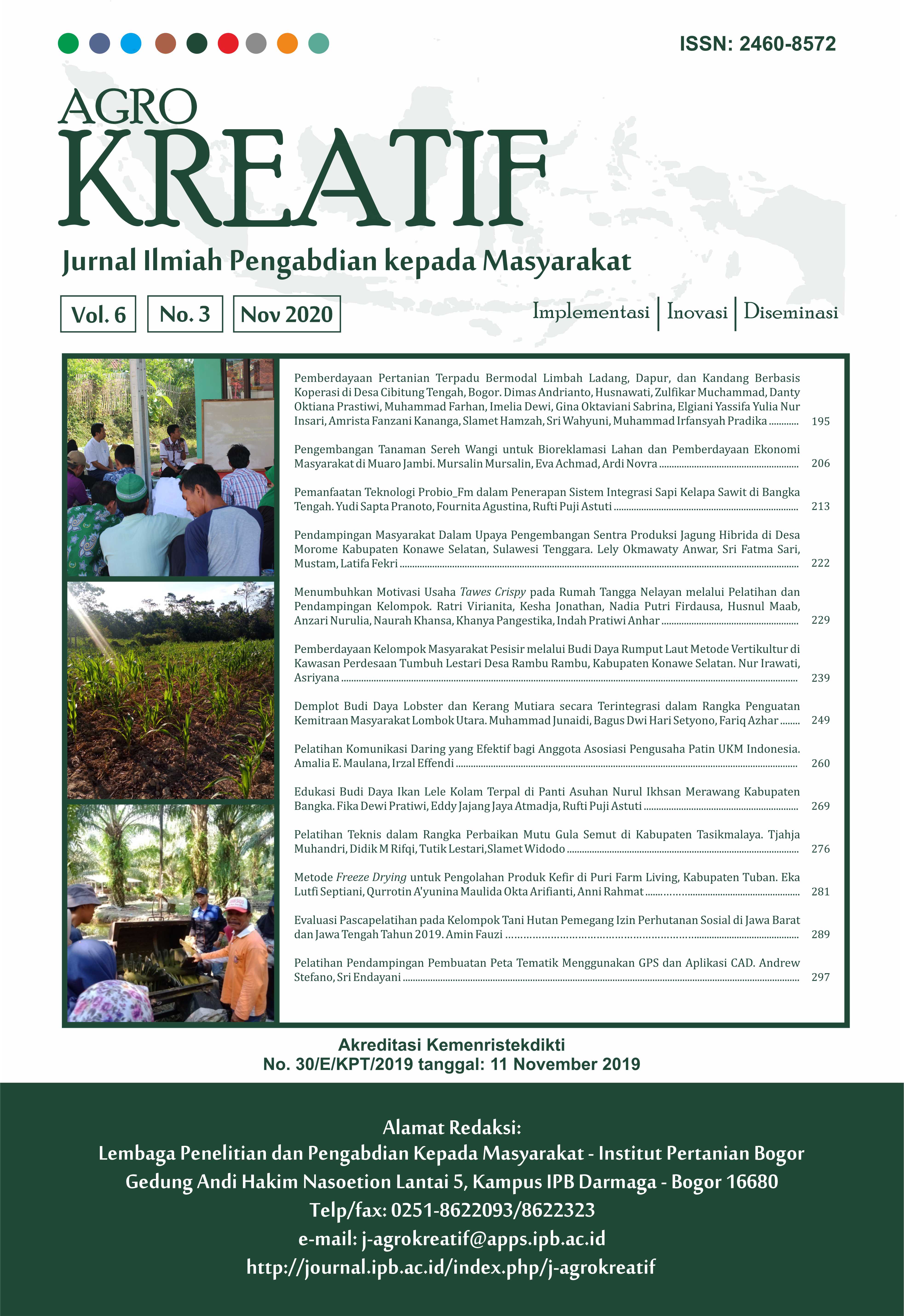Evaluasi Pascapelatihan pada Kelompok Tani Hutan Pemegang Izin Perhutanan Sosial di Jawa Barat dan Jawa Tengah Tahun 2019
Abstract
Social forestry is sustainable forest management system implemented by local communities of Forest Farmer Group (FFG) aiming to increase community welfare, environmental balance and social cultural dynamics. Environment and Forestry Training Center Kadipaten conducted training to support social forestry programs with on-site model and was held August‒October 2018 in West Java and Central Java. The post-training evaluation was conducted one year after the training finished from June‒August 2019. The post-training evaluation aims to assess the suitability of the training materials with the needs of the farming business and the benefits of the training on the farming business developed by KTH. Data collection is done through questionnaires and interviews. The data analysis used descriptive analysis. The evaluation results on several training, i.e measurement and participatory mapping of social forestry areas, agroforestry engineering, oyster mushroom cultivation, making, packaging and marketing of bokashi, and nature tour guide showed that aspects of the relevance of the training to the needs of farming businesses are in the medium to high categories. The benefits of training to the farming businesses are in the medium and high category. To improve the quality of the training process and results, it is necessary to conduct a more careful analysis of training needs so that the training program is in line with the needs of the target community.
Downloads
References
Ali M. 2009. Pendidikan untuk Pembangunan Nasional. Jakarta (ID): Grasindo.
Arthur JrW, Bennett JrW,Edens PS, Bell ST. 2003. Effectiveness of Training in Organizations: A Meta-Analysis of Design and Evaluation Features. Journal of Applied Psychology. 88(2): 234‒245. https://doi.org/10.1037/0021--010.88.2.234
Bernardin HJ, Russell J. 1998. Human Resource Management, Second Edition. Singapore (SG): McGraw-Hill Book Co.
Gasong D. 2018. Belajar dan Pembelajaran. Yogyakarta (ID): Budi Utama.
Huberman AM, Miles MB. 2009. Manajemen Data dan Metode Analisis, eds. Norman Denzin K, Lincoln YS. Handbook of Qualitative Research terjemahan Dariyatno. Yogyakarta (ID): Pustaka Pelajar.
Hadi DW. 2020. KLHK Fokus Tingkatkan Kemampuan Masyarakat Pemegang Ijin Hutan Sosial. [Internet]. [diakses, 13 April 2020]. Tersedia pada: http://ppid.menlhk.go.id/siaran_pers/browse/1857
[KLHK] Kementerian Lingkungan Hidup dan Kehutanan. Peraturan Menteri Lingkungan Hidup dan Kehutanan Nomor. P.83/MENLHK/ SETJEN/KUM. 1/10/2016 Tentang Perhutanan Sosial.
[KLHK] Kementerian Lingkungan Hidup dan Kehutanan. Peraturan Menteri Lingkungan Hidup dan Kehutanan Nomor Nomor. P.39/MENLHK/ SETJEN/KUM. 1/6/2017 Tentang Perhutanan Sosial di Wilayah Kerja Perum Perhutani.
Laird D. 2003. Aproaches to Training and Development, third edition. Cambridge (US): Perseus Publishing.
Nawawi H. 2011. Manajemen Sumber Daya Manusia. Yogyakarta (ID): Gadjah Mada University Press.
Pejabat Pengelola Informasi dan Dokumentasi (PPID) Kementerian Lingkungan Hidup dan Kehutanan. KLHK Fokus Tingkatkan Kemampuan Masyarakat Pemegang Ijin Hutan Sosial. 2019. [Internet]. [Diunduhpada: 5 Desember 2019]. Tersedia pada: https://ppid.menlhk.go.id/siaran_ pers/browse/1857.
Schuler RS. 1981. Personel and Human Resource Management. Minnesota (USA): West Publishing.
Sugiyono. 2010. Metode Penelitian Kuantitatif, Kualitatif dan R&D. Bandung (ID): Alfabeta.
Thang NN, Truong Q. 2011. The impact of training on firm performance in a transitional economy: Evidence from Vietnam. Research and Practice in Human Resource Management. 19(1): 11‒24.
This work is licensed under a Creative Commons Attribution-NonCommercial 4.0 International License.



















